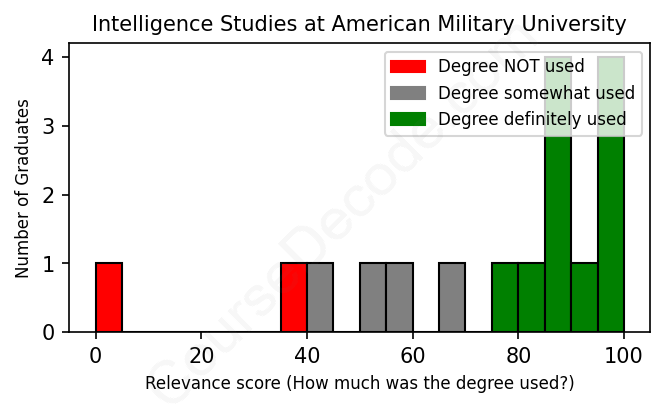
First, some facts. Of the Intelligence Studies graduates from American Military University we've analyzed , here's how many have used (or NOT used) their degree in their career:

These are estimates based on AI analysis of 17 LinkedIn profiles (see below).
The verdict? Above average. Overall, with an average relevance score of 73%, Intelligence Studies graduates from American Military University have a higher likelihood (+6%) of finding work in this field compared to the average graduate across all fields:
And for comparison, here's the chart for all profiles we've looked at across all degrees.
Also, after graduating, 41% of these graduates have pursued further education other than another Bachelor's degree (such as a Masters degree or other), compared to the average across all profiles of 35%. This suggests you may need more than just a Bachelors degree to be competitive as a Intelligence Studies graduate.
See the details:
|
Relevance score: 100% We think this person has gone into a career highly relevant to their degree. We think this person has gone into a career highly relevant to their degree.
DEGREE INFOGraduated in 2015 from American Military University with a Bachelors Degree in Intelligence Studies. No other secondary education since. JOB HISTORY SINCE GRADUATIONForeign Disclosure Officer United States Department of the Army Jan 2021 - Present ABOUTExperienced Foreign Disclosure Officer with skills in Intelligence, Operational Planning, Mentoring, Management, and Training. Strong military and protective services professional with a Bachelors Degree focused in Intelligence Studies from American Military University. |
The top 10 most common jobs done by the graduates we've analyzed (ranked most common to least) are:
The graduates from American Military University with a degree in Intelligence Studies have ventured into a variety of job roles, but the most common professions seem to be within military or defense sectors, particularly in positions related to intelligence analysis and operational planning. For example, roles like Intelligence Analyst, Counterintelligence Staff Officer, and Foreign Disclosure Officer leverage the skills acquired during their studies to assess and analyze information pertinent to national security and military operations. There's a notable trend where many have secured positions that require analytical thinking and strategic planning, reflecting the core competencies that intelligence studies emphasize.
However, not all roles are directly relevant to intelligence studies. Many graduates have taken on positions in legal firms, logistics companies, or even administrative roles where the connection to their degree is rather tenuous. For instance, jobs like Summer Associate or Area Manager II mostly rely on general skills that don’t specifically engage with the principles of intelligence. Overall, while a significant number of graduates are engaged in roles that tie nicely to their intelligence expertise, a fair share seems to have drifted into unrelated fields, highlighting that a degree in Intelligence Studies can be versatile but not exclusively tailored for intelligence roles.
Here is a visual representation of the most common words in job titles for Intelligence Studies graduates (this is across all Intelligence Studies graduates we've analyzed, not just those who went to American Military University):

Graduates of the Intelligence Studies program at American Military University generally have a varied career trajectory that stays fairly aligned with their field of study, especially within the first few years post-graduation. Many of these alumni find themselves stepping into roles as intelligence analysts or working with military and government organizations shortly after they earn their degrees. For instance, the majority of those who graduated in the earlier years have landed jobs as Intelligence Analysts at the NSA, various military intelligence units, or other government defense sectors. These positions often serve as the springboard for further advancement within governmental agencies or military ranks, which can be seen in the steady progression of many alumni into senior roles over time.
Fast forward five to ten years after graduation, and you'll notice that many graduates have moved into increasingly specialized or leadership roles. Some have transitioned to positions in private defense contractors or security firms, while others maintain a steady path in governmental organizations, ascending to higher-level strategic roles or management. For example, individuals who started as analysts or operations officers have advanced to supervisory or executive-level positions. However, it’s worth noting a few researchers or instructors have ventured off into non-traditional paths, such as teaching or corporate roles that are somewhat distant from intelligence studies. Overall, it seems like a good number of these graduates find solid opportunities relevant to their degrees, especially within the military and intelligence sectors.
Getting a Bachelor’s degree in Intelligence Studies at American Military University is generally considered to be on the more manageable side compared to some other college programs. The coursework focuses on topics like analysis, security issues, and data interpretation, which can be interesting and engaging for those who are passionate about the field. While there can be some challenging assignments and a good amount of reading, AMU’s online format tends to cater well to students who are balancing other commitments, making it a bit easier to handle. Overall, if you’re motivated and enjoy the subject matter, you’ll likely find the program to be doable and even enjoyable!
Most commonly, in the LinkedIn profiles we've looked at, it takes people 8 years to finish a Bachelor degree in Intelligence Studies.
Based on the job histories of these Intelligence Studies graduates from American Military University, it appears that many of them have navigated their careers into pretty solid positions, especially those who served in the military and transitioned into corporate roles. For instance, graduates who started in intelligence roles at agencies like the NSA or the Coast Guard have generally moved into senior specialist or analyst roles, which typically come with good salaries. Others have gone on to law or various specialized defense roles, often which also pay well. That being said, some early-career jobs like technician or entry-level associate roles might not have been super lucrative, but overall, they’ve built careers that likely pay decent money, reflecting the stability in many government and defense jobs. So, yeah, it looks like they’re doing alright financially for the most part!
Here is a visual representation of the most common words seen in the "about" section of LinkedIn profiles who have a Bachelor degree in Intelligence Studies (this is across all Intelligence Studies graduates we've analyzed, not just those who went to American Military University). This may or may not be useful:

Here are all colleges offering a Bachelor degree in Intelligence Studies (ordered by the average relevance score of their Intelligence Studies graduates, best to worst) where we have analyzed at least 10 of their graduates:
| College | Score | Count |
|---|---|---|
 American Military University American Military University
|
73 | 17 |